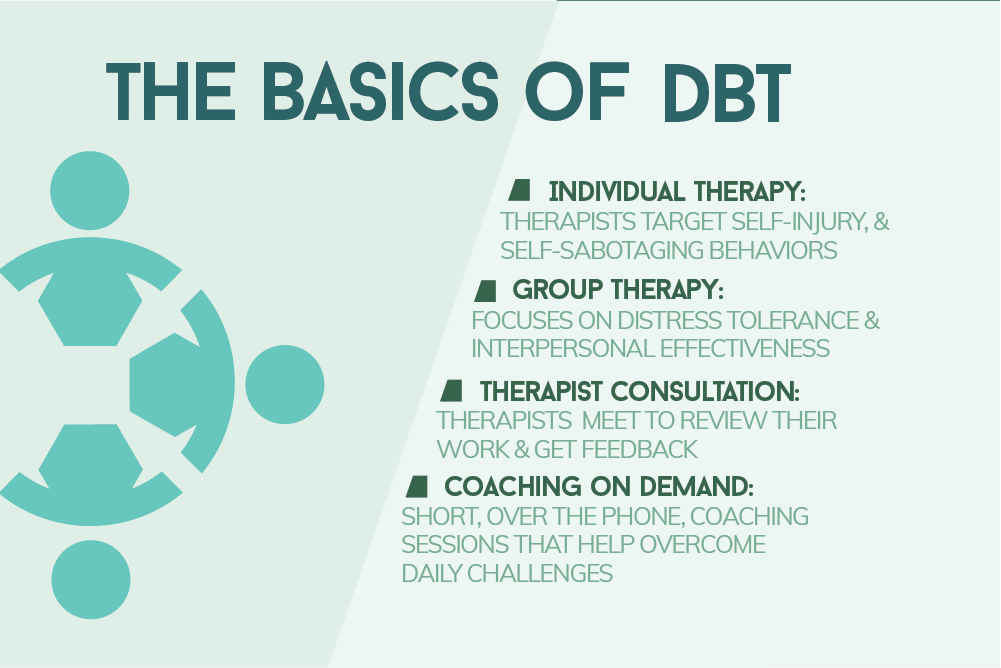
Therefore, weekly consultation team meetings are an essential part of DBT. Therapy with borderline patients is regarded as particularly challenging for therapists.

Conclusions from this study are limited, however, because only patients whose health insurance covered an unusually high number of individual therapy sessions and skills group sessions were included in this trial. So far, a study by Friedrich and colleagues is the sole German effectiveness-study showing positive outcome for outpatient DBT. Results indicate high effectiveness of the treatment, mostly based on report of pre-post changes of relevant outcome variables. Several studies were conducted investigating effectiveness of DBT under routine health care conditions. Accordingly, the necessity of effectiveness studies has also been emphasized for the treatment of borderline patients, e.g.

In order to transfer results of RCT studies to routine clinical care, a three-phased program for the evaluation of psychotherapy has been proposed: a pilot phase (stage 1) followed by RCTs with the aim to investigate the efficacy of a treatment form (stage 2) and the conduction of effectiveness studies under routine clinical settings (stage 3) e.g. While efficacy-studies – usually with high internal validity - answer the question whether a specific intervention works for a specific clinical problem, effectiveness aim to investigate how a certain treatment approach works under clinical routine circumstances and thus enlarges the external validity. įor several reasons, generalizability of RCTs to the actual routine health care situation is limited. It should also be noted that treatment with DBT showed a marked reduction of disorder-related direct and indirect monetary costs. ĭBT has proven especially effective in reducing self-injuriousbehavior, suicide attempts and inpatient treatment days. Thus, evidence-based treatment guidelines including those from the American Psychological Association and the German S2-Guidelines assign the highest empirical evidence for DBT as a treatment approach for BPD.

conclude that DBT is the only approach developed for the treatment of borderline patients with several RCT comparison studies available. In these studies, length of treatment varied between 6 and 12 months. patients with BPD as well as patients with another Cluster B personality disorder were included, with the majority (92%) meeting BPD criteria. , only female participants were included in these trials. Except for the studies by Feigenbaum et al. Five of these studies compared DBT with treatment-as-usual (TAU), one study with a client-centered approach, one study with TFP and supportive therapy and two other studies with treatment by experts. Under routine mental health care conditions in Germany, outpatient DBT leads to positive results comparable to those reported in other effectiveness studies and in randomized controlled trials.Ī number of randomized controlled trials (RCTs) have demonstrated the efficacy of outpatient dialectical behavior therapy (DBT) for the treatment of patients with borderline personality disorder (BPD). Fewer therapy discontinuations by patients were observed when therapists participated in consultation teams.

At the end of the first treatment year, 77% of the patients no longer met criteria for BPD diagnosis. Patients significantly improved regarding self-injurious behaviors, number of inpatient hospital stays, severity of borderline symptoms and psychopathology. Dependent variables were number and duration of inpatient treatment stays, number of suicide attempts and non-suicidal self-injury, severity of borderline symptoms, depression, level of dissociation, and general psychopathology. Overall, n =78 patients started the study, 47 patients completed one year of treatment. Outcome was assessed at four times throughout an initial phase (of up to five therapy-sessions) and an additional 12 months of therapy. In this paper, results for the first year of treatment are reported. The study has a longitudinal design over a course of four years with six assessment points. The aim of this study is to examine the effectiveness of DBT for BPD under the routine health care situation in Germany. However, generalizability of this outcome to the routine health care (effectiveness) has rarely been investigated to date. Dialectical behavior therapy (DBT) has been proven to be an efficacious treatment for borderline personality disorder (BPD) in several randomized controlled trials (RCTs).


 0 kommentar(er)
0 kommentar(er)
